八下第九单元知识点(自己整理)
人教版八年级下册英语复习 Unit 9 重要短语、句型、重点讲解及作文范文

人教版八年级下册英语 Unit 9重要短语、句型、重点讲解及作文范文Unit 9 Have you ever been to a museum?一、重点短语1. at night在夜晚2. all year round一年到头;终年3. be far from 离……远4. in the dark 在黑暗中5. in the past 在过去6. have been to 去过某地7. go somewhere different 去不同的地方8. take the subway 坐地铁9. put up a tent搭帐篷10. different kinds of各种各样的11. thousands of 数以千计的12. three quarters 四分之三13. have problem doing sth. 做某事很难14. a couple of times 好几次15. right now 现在;目前16. hear of 听说17. take a ride兜风第1页共12页18. encourage sb. to do sth. 鼓励某人做某事19. on the one hand... on the other hand. 一方面,另一方面二、重点句型1. Have you ever been to... ?Have you ever been to a science museum? 你曾经去过科学博物馆吗?2. Let’s. … Let’s go somewhere different today. 我们今天去个不同的地方吧。
3. It’s +adj. +that...It’s unbelievable that technology has progressed in such a rapid way!科技以如此迅猛的方式发展真是令人难以置信啊!4. Whether... , you’ll...Whether you like Indian food or Japanese food, you’ll find it all in Singapore!不管你喜欢印度食品还是日本食品,在新加坡你都能找到!5. One great thing… is that….One great thing about Singapore is that the temperature is almost the same all year round. 新加坡一个很大的特征是它的气温几乎一年到头都是一样的。
八年级下册第九单元知识点
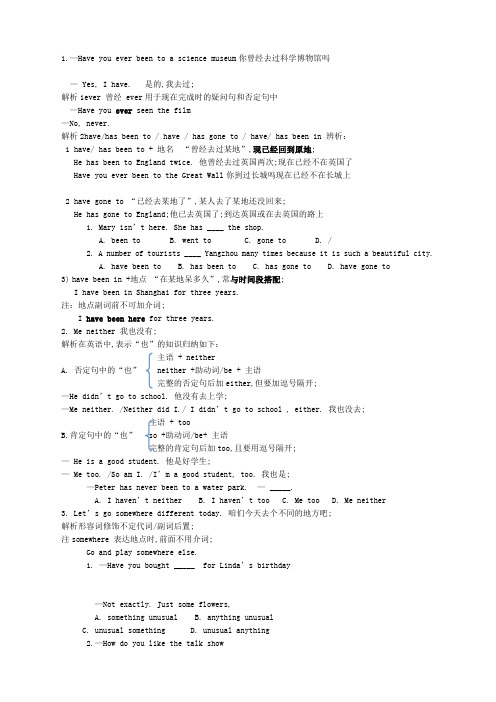
1.—Have you ever been to a science museum你曾经去过科学博物馆吗— Yes, I have. 是的,我去过;解析1ever 曾经 ever用于现在完成时的疑问句和否定句中—Have you ever seen the film—No, never.解析2have/has been to / have / has gone to / have/ has been in 辨析:1 have/ has been to + 地名“曾经去过某地”,现已经回到原地;He has been to England twice. 他曾经去过英国两次;现在已经不在英国了Have you ever been to the Great Wall你到过长城吗现在已经不在长城上2 have gone to “已经去某地了”,某人去了某地还没回来;He has gone to England;他已去英国了;到达英国或在去英国的路上1. Mary isn’t here. She has ____ the shop.A. been toB. went toC. gone toD. /2. A number of tourists ____ Yangzhou many times because it is such a beautiful city.A. have been toB. has been toC. has gone toD. have gone to3)have been in +地点“在某地呆多久”,常与时间段搭配;I have been in Shanghai for three years.注:地点副词前不可加介词;I have been here for three years.2. Me neither 我也没有;解析在英语中,表示“也”的知识归纳如下:主语 + neitherA. 否定句中的“也” neither +助动词/be + 主语完整的否定句后加either,但要加逗号隔开;—He didn’t go to school. 他没有去上学;—Me neither. /Neither did I./ I didn’t go to school , either. 我也没去;主语 + tooB.肯定句中的“也” so +助动词/be+ 主语完整的肯定句后加too,且要用逗号隔开;— He is a good student. 他是好学生;— Me too. /So am I. /I’m a good student, too. 我也是;—Peter has never been to a water park. — _____.A. I haven’t neitherB. I haven’t tooC. Me tooD. Me neither3. Let’s go somewhere different today. 咱们今天去个不同的地方吧;解析形容词修饰不定代词/副词后置;注somewhere 表达地点时,前面不用介词;Go and play somewhere else.1. —Have you bought _____ for Linda’s birthday—Not exactly. Just some flowers,A. something unusualB. anything unusualC. unusual somethingD. unusual anything2.—How do you like the talk show—I think it’s ________, but some people think it’s so________.A. wonderful enough; boredB. enough wonderful; boringC. wonderful enough; boringD. enough wonderful; bored拓展不定副词:somewhere, anywhere, nowhere用法不定副词被定语修饰时,定语必须放在其后somewhere warm 暖和的地方1. I don’t want to go ______.A. somewhere coldB. cold somewhereC. anywhere coldD. cold anywhere2.—Do you have your summer plan, Bill—Well, I want to go ______ to relax with my family.A. interesting somewhereB. nowhere interestingC. somewhere interesting3.—Where would you like to go on vacation, Lily—It’s hot here. I’d like to go ____.A. anywhere cool somewhere cool4. It’s really interesting, isn’t it反意疑问句结构:陈述句 + 附加疑问句原则: 1.前肯后否,前否后肯 2.前名后代 3.时态一致2013温州1—It’sFather’sDay,—Yes.Let’sbuyagiftforDad.A.isn’titB.doesn’titC.isn’theD.doesn’the2013永州1Yourschoolisverybeautiful,__________’titityourschool2013益阳3—Jimhadnothingforbreakfastthismorning,_______—______.Hegotuptoolate.A.hadshe;YesB.Hadn’the;YesC.didhe;No5. I learned about the inventions that led to color movies, too.解析1invent v.发明→inventor n.发明家→ invention n. 发明记Edison , a great ________, _______over 1’000_______ all his life.invent1. I think the light bulb is one of the most important__________invent2. The car ___________invent in 1885.Gibert ____________electricity, but Edison ___________ the electric light bulb.吉尔贝特发现了电,而爱迪生发明了电灯泡;1. The light bulb is one of the most useful _____________invent in the world.2. What do you think is the greatest ______ invent of the twentieth century3. After hard training for a long time, Liu Xiang ___the records again.A. brokeB. achievedC. inventedD. completed解析2lead →led→ led v引导,引诱→ leader n 领导人谚语All roads lead to Rome. 条条大路通罗马拓展1 lead to sth 导致……Too much work and too little rest oftenlead toillness. 过量的工作和过少的休息会引起疾病;2 lead sb. to sw 引导某人去某地The tour guide led us to many different places. 导游带我们去了很多地方;3 lead sb. to do sth 引导某人干某事He leads us to work hard. 他带着我们努力工作;put up a tent and cooked outside.解析put up 搭起;举起;张贴短语put away 把……收起来 put on 穿上put out 熄灭 put down 放下2013湖北孝感4_______ your sunglasses, Sally. The sun is so bright.A. Put downB. Put upC. Put awayD. Put on7. They have information about different computers and who invented them.他们掌握了关于不同电脑以及其发明者的信息;解析information信息;资料辨析information/message/ news1 information指电视、电脑或其它媒介等获得的信息,为不可数名词;a piece of information 一条信息You can get much information on the Internet.2 message“消息、口信、电报”指书面、口头、无线电等传来的信息,为可数名词;I’ll leave a message for her.3 news“新闻;消息”,指通过报纸、电台、电视等新闻媒介报道的最新消息,为不可数名词; a piece of news 一则新闻No news is good news. 没有消息就是好消息;Is there any good news today 今天有什么好消息吗1.—What ______ can you give me on learning English—I think you could join an English clubA. adviceB. newsC. messagesD. information2. Just search the internet, you can get almost all the _____ you need.A. informationsB. informationC. pictureD. story3. —Where is Thomas—He left a ______ .A. informationB. messageC. news4. The students didn’t find much ___ about the topic on that website.A. reportB. articleC. informationD. story8. It’s unbelievable that technology has progressed in such a rapid way解析1unbelievable 难以置信的;不真实的记believe +able = believable 可信的un + believable =unbelievable 难以置信的That story is unbelievable.解析2progress v进步;进展 n不可数nmake progress in 在……方面取得进步I have made much progress in English. 我在英语方面取得很大的进步;2012湖北黄冈3—Why is Harvey’s mother so happy—Because only three students _____, ____ his son Harvey.A. failed the exam ;besidesB. made progress; exceptC. made progress; includingD. passed the exam; without9.I wonder how much more computers will be able to do in the future.我想知道电脑在将来能否做更多的事情;解析wonder1 v.想要知道= want to know后接从句,也可接“疑问词+不定式”I wonder who she is.I wonder what to do next.2 n. 惊奇;奇观the seven wonders of the world 世界七大奇观记 I wondered how on earth this wonder was built.1.—Is Kate serious—I ________. She never means it.A. supposeB. agreeC. believeD. wonder2.—I wonder when you _______in New York.—I will send an e-mail to you as soon as I _______there.A. arrive; will getB. will arrive; getC. will arrive; will get10.I’ve really been to a very unusual museum in India , the International Museum of Toilets.我曾去过印度一个不同寻常的博物馆,印度厕所博物馆;解析unusual adj.特别的;不同寻常的反usualan unusual experience 不同寻常的经历2013湖北—This is a useful dictionary, I think.—So it is, and it’s ____________unusual one.A. theB. anC. aD. 不填拓展 un + adj.unhappy unfortunate uneasy unluckyunable unfriendly unimportant11. It also encourage governments and social groups to think about ways to improve toilets in the future. 它激励政府和社会团体积极想方法去改进未来的厕所;解析1encourage sb. to do sth 鼓励某人做某事encourage sb. in sth 在某方面鼓励某人2013辽宁鞍山3Jessica’s parents always encourage her ___ out her opinions.A. speakB. speakingC. to speakD. will speak解析2social 社会的→ society n 社会→socialist 社会主意者social problem 社会问题12. It’s a relaxing and peaceful place near a lake. 它靠近湖,是一个令人放松和安静的地方;解析peaceful adj. 和平的,安宁的拓展peace n. 和平→ peaceful adj. 和平的→ peacefully adv. 和平地拓展记忆beauty n. 美丽→beautiful adj. 美丽的help n. 帮助→helpful adj. 有帮助的use n. 用途→useful adj. 有用的thank n. 感谢→thankful adj. 感激的1. That night was so _________peace2. All the people who love________hope that the world is ____forever, without wars.peace3. It is our hope that we can live in a______ world and say goodbye to wars for ever.A. similarB. peacefulC. familiarD. natural13.The tea art performances show how to make a perfect cup of tea with beautiful tea sets.茶艺表演展示了如何用精美的茶具去泡出一杯好茶;解析1performan v. 表演;演出→performance n 演出;表演musical performance 音乐演奏解析2perfect adj. 完美的Practice makes perfect. 熟能生巧She speaks English ____ than I.A. PerfectB. PerfectlyC. more perfect perfectly.14. Watching them prepare the tea with the beautiful tea sets is just as enjoyable as drinkingthe tea itself. 看着他们用精美的茶具泡茶就如同品茶一样享受;解析1 tea sets 茶具green tea 绿茶 black tea 红茶 milk tea 奶茶Oolong tea 乌龙茶 make tea 泡茶 serve tea to ... 给……敬茶解析2itself 它自己反身代词1 反身代词的构成一、二人称的反身代词构成:形容词性物主代词+self/selves构成第三人称的反身代词构成:人称代词宾格+self/selves2 反身代词的常见搭配:3 反身代词Array必须与主语保持人称的一致;2013浙江温州—I’llhave atennisgametomorrow.I’m alittle bitnervous.—Believe in _______ . You’re the best in our club.A. herselfB. myselfC. yourselfD. himself2013 上海My old neighbor Charles felt _______ after his children moved out.A. lonelyB. safelyC. angrilyD. happily15. And collecting tea sets...... 和收集茶具解析collect v. 收集→ collection n. 收藏→collector n. 收藏家collect stamps /coins 收集邮票/硬币have a collection of books 收藏书记He is a famous ____________ and he has _________ a lot of _________collect.①Tom has been ___________ stamps since he was in Grade Threecollect.② He is a great __________. Now he has a great ________of stampscollect.③ ____ you ____ stamps since you were sixA. Did; collectB. Do; collectC. Have; collectD. Have ; been collecting16. There are some special German paintings there right now.解析1German 德国人 pl Germans解析2right now1 现在= at the moment 可用于一般现在时或现在进行时They are listening to the concert right now.2 立刻;马上I’ll do it right now.2012湖北黄冈1—Jim, is your brother in—No, he is reading in the library at the moment.A. right nowB. at timesC. right nowD. at once17. You can also see see the Disney characters walking around the park.解析walk around 四处走动around作介词/副词,常与下列动词搭配使用:go around 四处走动 look around 环顾;参观travel around 到处旅游 show sb around sp. 带领某人参观某地18.You can take take a ride on the boat for several days and eat and sleep on it.你可以在船上呆几天,吃饭、睡觉都可以;解析 take a ride 兜风 take took , taken v拓展take away 拿走 take care =be careful=look out 小心take good care of 好好照顾,照料 take down 取下来;拆毁take out 拿出 take off脱下;飞机等起飞take one's time 别着急,慢慢来 take one's temperature 量体温take a walk散步 take a rest休息一下19.Well, I’ve already been there a couple of times, but I’m happy to go again.嗯,我已经去过那里几次了,但我很高兴再去一次;解析 a couple of 两个;几个There are a couple of beds in the room. 房间里有几张床;This pair of shoes is a bit small for me. 这双鞋子对我而言有点小;。
八下英语九单元知识点

八下英语九单元知识点八下英语九单元重点的知识点都有哪些呢?你都掌握了吗?下面店铺给你分享八下英语九单元知识点,欢迎阅读。
八下英语九单元知识点一、重点词组1. at night在夜晚2. in a more natural environment在一个更自然的环境中3. all year round一年到头;终年4. be far from 离……远5. in the dark 在黑暗中6. in the past 在过去7. have been to sp. 去过某地8. science museum 科学博物馆9. history museum 历史博物馆10. amusement park 游乐园11. go somewhere different 去不同的地方12. go skating 去滑冰13. take the subway 坐地铁14. a great way to spend a Saturday afternoon一个过周六下午的好方法15. all the old movie cameras所有古老的电影摄影机16. learn about sth. 了解有关……的情况17. on the weekend 在周末18. camp in the mountains 在大山里露营19. put up a tent 搭帐篷20. in such a rapid way 以如此迅猛的方式21. different kinds of 各种各样的22. development of toilets 厕所的发展23. social groups 社会团体24. the tea art performances 茶艺表演25. make a perfect cup of tea with beautiful tea sets用漂亮的茶具沏一杯完美的茶26. a nice place to enjoy tea 一个品茶的好地方27. thousands of 数以千计的28. International Museum of T oilets国际厕所博物馆29. the Terracotta Army 兵马俑30. Southeast Asia东南亚31. Night Safari 夜间动物园32. three quarters 四分之三33. an English-speaking country一个讲英语的国家34. have problem doing sth. 做某事很困难35. during the daytime在白天36. a couple of times 好几次37. right now 现在;目前38. an amusement park with a special theme一个有特别的主题的游乐园39. walk around the park 在公园里到处走40. hear of 听说41. take a ride兜风42. another province另一个省43. the Bird’s Nest鸟巢44. encourage sb. to do sth.鼓励某人做某事45. on the one hand… on the other hand一方面……另一方面八下英语九单元知识点二、重点句型1. Have you ever been to…? 你曾经去过……吗? Have you ever been to a science museum? 你曾经去过科学博物馆吗?2. Let’s … 我们…… Let’s go somewhere different today. 我们今天去个不同的地方吧。
八年级下册九单元知识点总结

八年级下册九单元知识点总结八年级下册最后一个单元——九单元,是我们数学学习中的重要环节。
通过这一单元的学习,我们可以巩固和运用之前所学的知识,提高解决复杂问题的能力。
本文将对八年级下册九单元的知识点进行总结。
一、有理数的性质和计算有理数是我们数学学习的基础知识之一,对于九单元的学习也是至关重要的。
在这一单元里,我们将继续学习有理数的性质和计算方法,如有理数的大小比较、绝对值及相反数等。
通过这些知识点的学习,我们可以更好地应对有理数的操作和运用,并解决实际问题。
二、实数的性质九单元中,我们将学习实数的性质。
实数是有理数和无理数的总称,是一个更宽泛的概念。
在这一部分的学习中,我们将了解和掌握实数的有序性、区间及平方数根的性质等内容。
这些知识将帮助我们更好地理解实数的特点和运用。
三、线性方程与方程组在八年级下册的九单元中,我们将进一步学习线性方程及方程组。
线性方程是一个含有一次方程的方程,方程组是由多个线性方程联立的一组方程。
通过解这些方程和方程组,我们可以深入理解方程的运算规律,培养独立解决问题的能力。
四、一次函数与一元一次方程一次函数和一元一次方程是九单元的重要内容之一。
通过学习这些知识,我们可以更加深入地理解函数的概念和特点,并能够应用一次函数进行问题求解。
同时,一元一次方程也是实际生活中常见的问题形式,通过解决这些方程,我们可以提高我们的数学思维和解题能力。
五、图形的坐标和坐标图在九单元中,我们还将学习图形的坐标和坐标图。
通过学习这些知识,我们可以更加直观地表示和分析图形,并且能够将实际问题转化为数学问题进行求解。
掌握坐标和坐标图的知识,对于我们理解和利用图形的特性将起到重要的作用。
八年级下册的九单元,是我们数学学习的最后一个单元,也是对之前所学知识的进一步巩固和运用。
通过对有理数和实数的性质、线性方程和方程组、一次函数和一元一次方程,以及图形坐标和坐标图的学习,我们可以提高我们的数学思维和解题能力,为高中数学的学习打下坚实的基础。
人教版八年级下册英语第九单元知识点归纳总结

Unit9 Haveyoueverbeentoamuseum?一、词汇与短语◆重点单词A 局部1.amusement 消遣;玩耍n. 3.somewhere 在某处;到某处adv. 5.camera 照相机;摄影机;摄像机n. 7.invention 制造;制造物n. 9.invent 制造;制造v.2.social 社会的adj.4.peaceful 和平的;清静的adj. 6.performance 表演;演出n. 8.perfect 完善的;完全的adj. 10.itself (it 的反身代词)它自己pron.11.unbelievable 难以置信的;不真实的adj. 12.collect 收集;采集v.13.progress 进步;进展v.&n. 15.rapid 快速的;快速的adj. 17.unusual 特别的;不寻常的adj. 19.toilet 坐便器;厕所n. 14.theme 主题n.16.ride 供乘骑的游乐设施;短途旅程n. 18.province 省份n.20.encourage 鼓舞v.21.German 德国的;德语的;德国人的adj. 德语;德国人n.B 局部1.thousand 一千num. 3.safe 安全的;无危急的adj. 5.simply 仅仅;只;不过adj. 7.fear 几可怕;惧怕v.&n. 9.Indian 印度的adj. 印度人n. 2.fox 狐狸n.4.equator 赤道n. 6.spring 春天n. 8.mostly 主要地;通常adv. 10.location 地点;位置n.11.whether 不管……(还是);或者……(或者);是否conj. 12.Japanese 日本的;日本人的;日语的adj. 日本人;日语n. 13.whenever 在任何……的时候;无论何时conj.◆重点短语A 局部1.amusementpark 游乐场3.teaart 茶艺5.acoupleof 两个;一对;几个7.ahistorymuseum 历史博物馆9.aspacemuseum 太空博物馆11.anartmuseum 艺术博物馆13.awaterpark 水上公园2.learnabout 了解4.leadto 导致6.campinthemountains 在山中宿营8.putupatent 搭帐篷10.haveinformationabout 有关于……的信息12.progressinsucharapidway 进步如此快速14.acoupleoftimes 几次15.inthefuture 在将来17.haveagreattime 过得开心19.afilmmuseum 电影博物馆16.encouragesb.todosth. 鼓舞某人做某事18.somewheredifferent 某个不同的地方20.theteaartperformance 茶艺表演21.takearideontheboatforseveraldays 乘船旅行几天22.thehistoryanddevelopmentof…................. 的历史和进展B 局部1.allyearround 全年3.alotofthetime 大局部时间5.outsideofChina 在中国以外7.duringthedaytime 在白天9.becloseto 靠近;接近11.choosetodosth. 选择做某事2.thousandsof 数以千计的;许很多多的4.inthedark 在黑暗中6.anEnglish -speakingcountry 一个说英语的国家8.haveproblemsdoingsth. 做某事有困难10.thebesttimetodosth. 做某事的最好时间12.befarfrom 远离13.threequartersofthepopulation 人口的四分之三14.ontheonehand ……ontheotherhand ……一方面……另一方面……◆重点句子A 局部1.—Have youever beento thespacemuseum? —你曾去过太空博物馆吗?—Yes,Ihave.Howaboutyou? —是的,我去过。
Unit9重点短语语法及句型人教版英语八年级下册
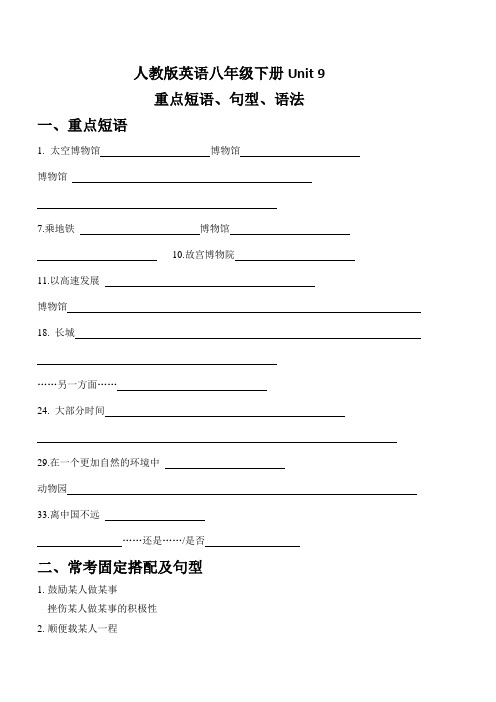
人教版英语八年级下册Unit 9重点短语、句型、语法一、重点短语1.太空博物馆博物馆博物馆7.乘地铁博物馆10.故宫博物院11.以高速发展博物馆18. 长城……另一方面……24. 大部分时间29.在一个更加自然的环境中动物园33.离中国不远……还是……/是否二、常考固定搭配及句型1.鼓励某人做某事挫伤某人做某事的积极性2.顺便载某人一程3.捎口信留口信4.取得进步(在……方面)5.孰能生巧:练习做某事:6.红茶给某人敬茶泡茶茶具煮茶乌龙茶7.位于8.与某人亲密、亲近与某地靠近几乎、几近9.是时候做某事了10.害怕做某事11.做某事的最佳方式12.put away put on put out put upput ……into put down put off put up with...13.成千上万的成百上千的14.分数表达法:(1)常见表达法:(2)特殊表达法:1/2:1/3:1/4:三、语法知识默写:现在完成时参考答案重点短语、句型、语法一、重点短语博物馆space museum 博物馆history museum博物馆art museum amusement parkhave a great time go skating7.乘地铁take the subway 博物馆the film museumcolor movies the Palace Museum11.以高速发展progress in a rapid way will be able to do sth.博物馆an unusual museum social groups the tea art performance put up a tent collect tea sets18. 长城the Great Wall the Bird’s Nest the Terracotta Armythousands of tourists take a holiday……另一方面……on one hand...on the other hand...24. 大部分时间 a lot of the time an English-speaking countrypractice your English during the daytime the best time to watch them29.在一个更加自然的环境中in a more natural environmentin a normal zoo all year around be/ get close to the equator33.离中国不远be not too far from Chinaa theme park ……还是……/是否whether...or not二、常考固定搭配及句型1.鼓励某人做某事encourage sb.to do sth.挫伤某人做某事的积极性discourage sb.fromd doing sth.2.顺便载某人一程give sb a ride/ lift3.捎口信take a message留口信leave a message4.取得进步(在……方面)make progress in...5.孰能生巧:Practice makes perfect.练习做某事:practice doing sth.6.红茶black tea 给某人敬茶serve tea to sb.泡茶make tea 茶具tea sets煮茶cook tea 乌龙茶oolong tea7.位于be located in.../ lie in...8.与某人亲密、亲近be/ get close to sb.与某地靠近be/ get close to sp.几乎、几近close to...9.是时候做某事了It’s time to do sth.10.害怕做某事fear to do sth.11.做某事的最佳方式the best way to do sth.put away 把...收好put on 穿上;增加(体重);上演put out 扑灭put up 举起;张贴;搭建put ……into 把...放进...里面put down 放下put off 推迟put up with...忍受...12.成千上万的thousands of... 成百上千的hundreds of...13.分数表达法:(1)常见表达法:基数词分子out of 基数词分母;基数词分子,序数词分母(分子>1,分母序数词加s.)(2)特殊表达法:1/2: a half 1/3:a third 1/4:a quarter15.随着社会的发展with the development of the society三、语法知识默写:现在完成时。
八年级下册英语第九单元知识点

八年级下册英语第九单元知识点八年级下册英语第九单元知识点(笔记)Unit 9 Can you come to my party?1.on Saturday afternoon 在星期六下午,在具体哪一天的是上午、下午或晚上用on,例如:on Sunday evening在星期天的晚上2.have to 必须(后跟动词原形)He has to get up early.他必须早起。
→(一般疑问句)Does he get up early? Yes,he does.No,he doesn’t. (否定句)He doesn’t have to get up early.他没有必要早起。
3.How about +名词代词V?ing:?怎么样?(用来征询意见或提出建议)How about=What about I like apples,how about you?我喜欢苹果,你呢?(you为代词)How about going shopping this afternoon?今天下午去购物怎么样?(go 为动词) 4. sth=want sth 想要某物Jim would like a new pen .吉姆香要一支钢笔。
Would like to do sth=want to do sth想做某事He’d like to watch TV. Would you like to do sth ? 你愿意做...?(用来提出建议或征求对方意见) ------would you like to go shopping with me ? 你想和我一起去买东西吗?------Yes,I’d love to ,but I’m doing my homework.我想去,但是我现在正在做家庭作业。
(=Sorry, I’m doing my homework.非常抱歉呢,正在做家庭作业。
) 5. prepare for sth为?做准备They are preparing for the work.他们正在为这项工作做准备。
初中英语八年级下册-八下 Moudule 9 重点知识、语法+练习

Module 9 Friendship 一.重点单词和短语回顾二.语法回顾宾语从句1.宾语从句的引导词可由what,who,whose,which,why,when,where,how等疑问代词和疑问副词引导。
eg:Tell me what you want. 告诉我你想要什么。
You may ask him when he will come. 你可以问问他什么时候来。
Do you know whom(who) he will invite? 你知道他会邀请谁吗?I don't know whose book it is. 我不知道这是谁的书。
2.宾语从句的语序宾语从句的语序必须是陈述句语序,尤其要注意whether/if和wh引导的宾语从句的语序,即按照“主语+谓语……”的语序。
eg:Is he good at English? 他擅长英语吗?Can you tell me if he is good at English? 你能够告诉我他是否擅长英语吗?Why is winter colder than summer? 为什么冬季比夏季更冷?Do you know why winter is colder than summer? 你知道为什么冬季比夏季更冷吗?Where does he live? 他住在哪里?I don't know where he lives. 我不知道他住在哪里。
3.由if或whether引导的宾语从句,其中if/whether意为“是否;是不是”,宾语从句用陈述语序。
eg:I don't know if/whether it is fine tomorrow. 我不知道明天是否是晴天。
Do you know if/whether he'll come? 你知道他是否会来吗?whether和if在句中的具体用法:(1)whether和if在从句中不充当任何句子成分,只起连接作用,但不能省略。
八年级下英语第九单元知识点.doc
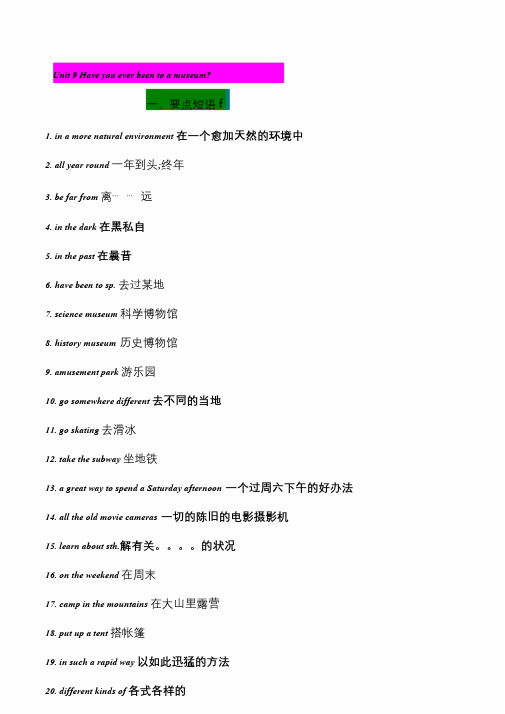
Unit 9 Have you ever been to a museum?一、要点短语f1. in a more natural environment 在一个愈加天然的环境中2. all year round 一年到头;终年3. be far from 离⋯⋯远4. in the dark 在黑私自5. in the past 在曩昔6. have been to sp. 去过某地7. science museum 科学博物馆8. history museum历史博物馆9. amusement park 游乐园10. go somewhere different 去不同的当地11. go skating 去滑冰12. take the subway 坐地铁13. a great way to spend a Saturday afternoon一个过周六下午的好办法14. all the old movie cameras一切的陈旧的电影摄影机15. learn about sth.解有关。
的状况16. on the weekend 在周末17. camp in the mountains 在大山里露营18. put up a tent 搭帐篷19. in such a rapid way 以如此迅猛的方法20. different kinds of 各式各样的21. development of toilets厕所的开展22. social groups 社会团体23. the tea art performances茶艺扮演24. make a perfect cup of tea with beautiful tea sets 用美丽的茶具沏一杯完美的茶25. a nice place to enjoy tea 一个品茶的好当地26. thousands of 数以千计的27. International Museum of Toilets 世界厕所博物馆28. the Terracotta Army 兵马俑29. Southeast Asia东南亚30. Night Safari 夜间动物园31. three quarters 四分之三32. an English-speaking country一个讲英语的国家33. have problem doing sth. 做某事很困难34. during the daytime 在白日35. a couple of times 好几次36. right now 现在;现在37. an amusement park with a special theme一个有特别的主题的游乐园38. walk around the park 在公园里处处走39. hear of 传闻40. take a ride 兜风41. another province另一个省42. the Bird?s Nest鸟巢43. encourage sb. to do sth鼓. 励或人做某事44. on the one hand... on the other hand一. 方面,另一方面45. space museum太空博物馆46. amusement park 游乐园47. water park 水上公园48. on board 在船上49. end up完毕50. all year round 全年51. tour guide导游52. flight attendant 空中乘务员53. three times 三次54. at that time 在那时55. in time 及时56. on time 准时57. all the time 一向58. more than = over 超越59. wake up 叫醒60. during the daytime 在白日61. roller coaster过山车62. hear of 传闻hear form 收到⋯ .来信63. around the world =all over the world 全世界64. all the time 一向65. argue with sb 与或人吵架66. in fact实际上,用在句首for example 例如67. all over 广泛,处处all over the world 全世界 all over China 全中国68. English-speaking country说英语的国家二、要点句型1. Have you ever been to... ?Have you ever been to a science museum?你从前去过科学博物馆吗?2. Let?s.Let?s go somewhere different today.咱们今日去个不同的当地吧。
八年级下第九章知识点

第九章 压强第1节 压强1、物理学中把垂直压在物体表面上的力叫做压力。
压力的方向总是垂直于物体 的接触面,指向受力物体的内部。
压力的作用点在被压物体的受力面上,作用点 等效作用在接触面的中心。
压力产生的条件:物体之间相互接触且发生相互挤压。
2、压力与重力不是相同的力。
一般情况下物体对支持面的压力并不等于物体的 重力,甚至有时与物体的重力毫无关系。
只有处于水平面上且竖直方向上只受重 力和支持力的物体对水平面的压力大小、方向才跟物体自身重力的大小、方向相 同,但此时压力仍不是重力。
3、实验:探究影响压力作用效果的因素提出问题:压力的作用效果跟什么因素有关?猜想与假设:压力的作用效果跟接触面积和压力的大小有关。
实验器材:小桌、砝码、泡沫塑料实验过程:(1)把小桌腿朝下放在泡沫塑料上,观察泡沫塑料被压下的深度。
(2)在桌面上放一个砝码,观察泡沫塑料被压下的深度。
(3)再把小桌翻过来,观察泡沫塑料被压下的深度。
交流与论证:(1)比较甲、乙可得:在受力面积相同时,压力越大,压力的作用效果越明显。
(2)比较乙、丙可得:在压力相同时,受力面积越小,压力的作用效果越明显。
实验结论:压力的作用效果不仅跟压力的大小有关,而且跟受力面积有关。
4、在物理学中,物体所受压力的大小与受力面积之比叫做压强。
压强的计算公式:S Fp =,式中字母p 表示压强,压强的单位是帕斯卡,简称帕,符号为Pa ;式中字母F 表示压力,压力的单位是牛顿,简称牛,符号为N ;式中字母S 表示受力面积,受力面积的单位是:米2 ,符号为m 2。
1Pa=1N/m 2,5、压强的计算公式S Fp = pS F = P FS =6、知识拓展:(1)压强是反映压力作用效果的物理量。
压力的作用效果越明显,压强越大。
(2)压强的单位“帕斯卡”是一个很小的单位。
一张报纸平放时对桌面的压强约为0.5帕。
(3)在进行计算时,注意单位要统一,力的单位必须为牛,面积的单位必须为米2,只有这样压强的单位才是帕斯卡。
人教版八年级下册Unit 9知识点总结
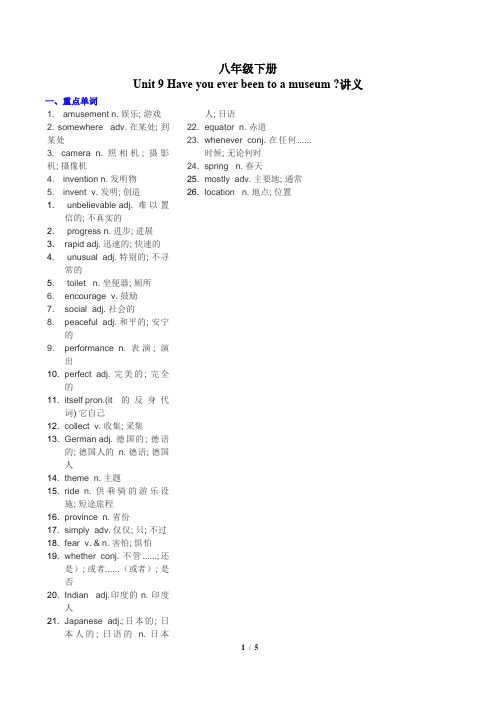
八年级下册Unit 9 Have you ever been to a museum ?讲义一、重点单词1. amusement n. 娱乐; 游戏2. somewhere adv. 在某处; 到某处3. camera n. 照相机; 摄影机; 摄像机4. invention n. 发明物5. invent v. 发明; 创造1. unbelievable adj. 难以置信的; 不真实的2. progress n. 进步; 进展3. rapid adj. 迅速的; 快速的4. unusual adj. 特别的; 不寻常的5. toilet n. 坐便器; 厕所6. encourage v. 鼓励7. social adj. 社会的8. peaceful adj. 和平的; 安宁的9. performance n. 表演; 演出10. perfect adj. 完美的; 完全的11. itself pron.(it的反身代词) 它自己12. collect v. 收集; 采集13. German adj. 德国的; 德语的; 德国人的n. 德语; 德国人14. theme n. 主题15. ride n. 供乘骑的游乐设施; 短途旅程16. province n. 省份17. simply adv. 仅仅; 只; 不过18. fear v. & n. 害怕; 惧怕19. whether conj. 不管......;还是); 或者......(或者); 是否20. Indian adj.印度的 n. 印度人21. Japanese adj.;日本的; 日本人的; 日语的n. 日本人; 日语22. equator n. 赤道23. whenever conj. 在任何......时候; 无论何时24. spring n. 春天25. mostly adv. 主要地; 通常26. location n. 地点; 位置二、短语总结1.at night在夜晚2.in a more natural environment在一个更加自然的环境中3.all year round 全年4.be far from 离……远5.in the dark 在黑暗中6.in the past 在过去7.have been to sp. 去过某地8.science museum 科学博物馆9.history museum 历史博物馆10.amusement park 游乐园11.go somewhere different 去不同的地方12.go skating 去滑冰13.take the subway 坐地铁14.a great way to spend a Saturday afternoon一个过周六下午的好方法15.all the old movie cameras所有的古老的电影摄影机16.learn about sth.解有关……的情况17.on the weekend 在周末18.camp in the mountains 在大山里露营19.put up a tent搭帐篷20.in such a rapid way 以如此迅猛的方式21.different kinds of各种各样的22.development of toilets 厕所的发展23.social groups 社会团体24.the tea art performances茶艺表演25.make a perfect cup of tea with beautiful tea sets用漂亮的茶具沏一杯完美的茶26.a nice place to enjoy tea 一个品茶的好地方27.thousands of 数以千计的28.International Museum of Toilets国际厕所博物馆29.the Terracotta Army 兵马俑30.Southeast Asia东南亚31.Night Safari 夜间动物园32.three quarters 四分之三33.an English-speaking country一个讲英语的国家34.have problem doing sth. 做某事很困难35.during the daytime在白天36.a couple of times 好几次37.right now 现在;目前38.an amusement park with a special theme一个有特别的主题的游乐园39.walk around the park 在公园里到处走40.hear of 听说41.take a ride兜风42.another province另一个省43.the Bird’s Nest鸟巢44.encourage sb. to do sth.鼓励某人做某事45.on the one hand... on the other hand.一方面,另一方面三、语法归纳现在完成时★★★1、概念:①一个动作开始于过去,持续到现在并有可能持续到将来。
人教版八年级下册Unit9知识点总结

八年级下册Unit 9 Have you ever been to a museum ? 讲义一、重点单词1.amusement n. 娱乐; 游戏2.somewhere adv. 在某处; 到某处3.camera n. 照相机; 摄影机; 摄像机4.invention n. 发明物5.invent v. 发明; 创造1.unbelievable adj. 难以置信的; 不真实的2.progress n. 进步; 进展3.rapid adj. 迅速的; 快速的4.unusual adj. 特别的; 不寻常的5.toilet n. 坐便器; 厕所6.encourage v.鼓励7.social adj. 社会的8.peaceful adj.和平的; 安宁的9.performance n. 表演; 演出10.perfect adj. 完美的; 完全的11.itself pron.(it 的反身代词)它自己12.collect v. 收集; 采集13.German adj. 德国的; 德语的; 德国人的n. 德语; 德国人14.theme n. 主题15.ride n. 供乘骑的游乐设施; 短途旅程16.province n. 省份17.simply adv. 仅仅; 只; 不过18.fear v. & n. 害怕; 惧怕19.whether conj. 不管... ; 还是); 或者(或者); 是否20.Indian adj. 印度的n. 印度人21.Japanese adj.; 日本的; 日本人的; 日语的n. 日本人; 日语22.equator n. 赤道23.whenever conj. 在任何..时候; 无论何时24.spring n. 春天25.mostly adv. 主要地; 通常26.location n. 地点; 位置二、短语总结1.at night 在夜晚1.1n a more natural environment 在一个更加自然的环境中3.all year round 全年4.be far from 离 .. 远1.1n the dark 在黑暗中1.2n the past 在过去7.have been to sp. 去过某地8.science museum 科学博物馆9.history museum 历史博物馆10.amusement park 游乐园11.go somewhere different 去不同的地方12.go skating 去滑冰13.take the subway 坐地铁14.a great way to spend a Saturday afternoon 一个过周六下午的好方法15.all the old movie cameras 所有的古老的电影摄影机16.1earn about sth. 解有关 .. 的情况16.2n the weekend 在周末18.camp in the mountains 在大山里露营19.put up a tent 搭帐篷20.in such a rapid way 以如此迅猛的方式21.different kinds of 各种各样的22.development of toilets 厕所的发展23.social groups 社会团体24.the tea art performances 茶艺表演25.make a perfect cup of tea with beautiful tea sets 用漂亮的茶具沏一杯完美的茶26.a nice place to enjoy tea 一个品茶的好地方27. thousands of 数以千计的1.1International Museum of Toilets 国际厕所博物馆29.the Terracotta Army 兵马俑30.Southeast Asia 东南亚31.Night Safari 夜间动物园32.three quarters 四分之三33.an English -speaking country 一个讲英语的国家34.have problem doing sth. 做某事很困难35.during the daytime 在白天36.a couple of times 好几次37.right now 现在;目前38.an amusement park with a special theme一个有特别的主题的游乐园39.walk around the park 在公园里到处走40.hear of 听说41.take a ride 兜风42.another province 另一个省43.the Bird ' s NeSt巢44.encourage sb. to do sth. 鼓励某人做某事45.on the one hand... on the other hand. 一方面,另一方面三、语法归纳现在完成时★★★1、概念:①一个动作开始于过去,持续到现在并有可能持续到将来。
人教版英语初二下册Unit9知识清单

初二八下U9知识清单一、重点单词1.invent 3.rapid 5.encourage 7.simply 9.socialv.发明;创造adj.快速的;迅速的v.鼓励adv.仅仅,只adj.社会的2.progress4.unusual6.collect8.mostly10.perfectn.进步adj.不同寻常的v.收集;采集adv.大部分地adj.完美的11.whenever conj.无论何时12.unbelievable adj.难以置信的输出:二、重点短语1.learn abou t了解3.pu t up搭建5.take a ride兜风7.be close to靠近输出:三、重点词法2.lead to导致4.a couple of两个;一对;几个6.wake up醒来8.all year r ound全年1.have trouble/difficulties/problems(in)doing sth.做某事有困难课文原文链接:Yo u won’t have any pro blem getting rice,noodles or dumplings.你不会有任何问题得到米饭,面条或者饺子。
ual adj.寻常的拓展:unusual adj.不寻常的usually adv.经常地e.g.The usual clothes for girls’party is the dress.e.g.I had an unusual experience when I traveled t o T urkey.课文原文链接:I’ve recently b een to a very unusual museum in India.我最近去了印度的一个非常不同寻常的博物馆。
3.encourage v.鼓励;激励encourage sb.t o do sth.拓展:鼓励某人做某事courage n.勇气encouragement n.鼓励课文原文链接:It also encourages governments and social gr oups to think a bo u t ways to improve toilets in the future.它也鼓励政府和社会团体思考改善未来厕所的方法。
八年级物理下册第九章知识点
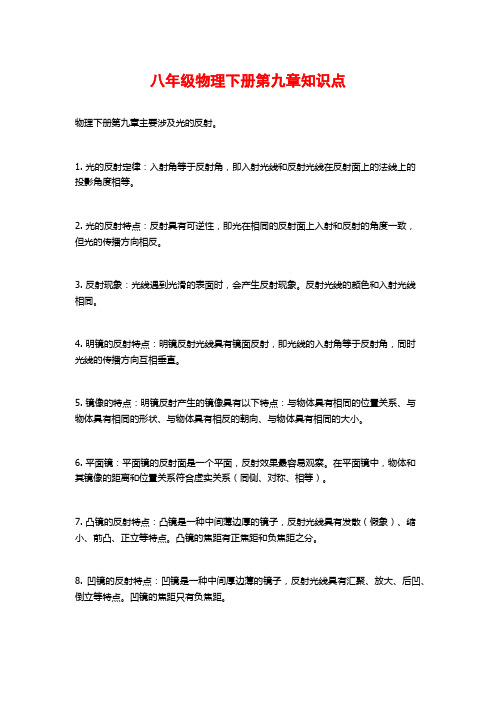
八年级物理下册第九章知识点
物理下册第九章主要涉及光的反射。
1. 光的反射定律:入射角等于反射角,即入射光线和反射光线在反射面上的法线上的
投影角度相等。
2. 光的反射特点:反射具有可逆性,即光在相同的反射面上入射和反射的角度一致,
但光的传播方向相反。
3. 反射现象:光线遇到光滑的表面时,会产生反射现象。
反射光线的颜色和入射光线
相同。
4. 明镜的反射特点:明镜反射光线具有镜面反射,即光线的入射角等于反射角,同时
光线的传播方向互相垂直。
5. 镜像的特点:明镜反射产生的镜像具有以下特点:与物体具有相同的位置关系、与
物体具有相同的形状、与物体具有相反的朝向、与物体具有相同的大小。
6. 平面镜:平面镜的反射面是一个平面,反射效果最容易观察。
在平面镜中,物体和
其镜像的距离和位置关系符合虚实关系(同侧、对称、相等)。
7. 凸镜的反射特点:凸镜是一种中间薄边厚的镜子,反射光线具有发散(假象)、缩小、前凸、正立等特点。
凸镜的焦距有正焦距和负焦距之分。
8. 凹镜的反射特点:凹镜是一种中间厚边薄的镜子,反射光线具有汇聚、放大、后凹、倒立等特点。
凹镜的焦距只有负焦距。
以上是八年级物理下册第九章关于光的反射的主要知识点。
八下unit9单元知识点总结

知识点 Unit 9Have you ever been to a museum?Section A部分知识点1.Have you ever been to a science museum?你曾经去过科学博物馆吗?1) have been to sp.去过某地2)ever 意为“曾经”,用于疑问句或否定句中,放在助动词与过去分词之间。
e.g. Have you ever been to Hong Kong?你曾去过香港吗?I haven’t ever spoken to her.我未曾和她说过话。
3)never意为“从来没有”常与before连用,多放在助动词与过去分词之间。
e.g. I have never travelled by plane before我.以前从来没有乘飞机旅行过。
2.比较: 1) He has been to Beijing他.曾去过北京。
(人已回来,可能在这儿)have / has been (to) 曾经到“过某地”,说话时此人不在那里,已经回来。
侧重指经历。
2)He has gone to Beijing他.已经去北京了。
(人已走,不在这儿)have / has gone (to)某人“已经去某地了”,说话时此人可能在路上或已到那里,不在这里。
3.Me neither.我也没 / 不⋯。
Me too. 我也一样 / 我也如此。
4.I went there back in April. 我在四月份去的那里。
5.It’sinteresting, isn’tit?反义疑问句6.The invention led to color movies.成就了彩色电影。
lead to7.put up a tent 搭帐篷8.I ’ ve never been camping我从.未野营过。
“现在完成进行时”结构为“have been +现在分词”,表示从过去某一时刻延续至今的动作。
人教版八年级英语下册Unit9知识点归纳

Unit9 Have you ever been to a museu知m?识点归纳一、重点短语1.at nigh在t 夜晚2.in a more naturalenvironment在一个更加自然的环境中3.all year rou一nd年到头;终年25.make a perfectcup of t eawith b eautiful t ea set用s秀丽的茶具沏一杯完善的茶26.a nice place to enjoy一t个e a品茶的好地方4. be far fro离m……远27. thousands of数以千计的5.in the dar在k 黑暗中6.in the pas在t 过去7.have been to s去p.过某地8.science museum科学博物馆28.International Museum of Toi国l e际t s厕所博物馆29.the Terracotta Arm兵y 马俑30.Southeast Asi东a 南亚9. history museum历史博物馆31. Night Safar夜i间动物园10.amusement park游乐园11.go somewhere differen去t不同的地方12.go skating去滑冰13.take the subwa坐y地铁32.three quarte四r s分之三33.an English-speakinc g ountry一个讲英语的国家34.have problem doing s t做h.某事很困难14.a great way to spend a Saturday afterno3o5n. during the dayti在me白天一个过周六下午的好方法15.allthe o ld m ovie cameras全部的古老的电影摄影机16.learn about s解t h有. 关。
的状况17.on the weekend在周末18.camp in the mountain在s大山里露营19.put up a t e搭n t帐篷20.in such a rapid w以ay如此迅猛的方式21.different kinds各o种f 各样的36.a couple of tim好es几次37.right now现在;目前38.an a musement park w ith a s pecialtheme 一个有特别的主题的游乐园39.walk around the pa在r k公园里处处走40.hear of听说41.take a ri兜d e风42.another provin另c e一个省43.the Bird’s N鸟es巢t22. development of toil厕e t所s的进展44. encourage sb. to do鼓s励t h某.人做某事23. social group社s 会团体45. on the one hand... on the other一h方and.24. the tea art performa茶nc艺es表演面,另一方面二、用法归纳1.a great way to do sth 一个做某事的好方法2.watch sb to do sth 观看某人做了某事3.It’sunbelievable that....很难信任......4.e ncourage sb to do sth 鼓舞某人做某事5.have problem (in〕doing sth 做某事很费力6.a s...as.. 和 .. 一样7.t he best time to do sth 做某事的最正确时间8.c hoose to do sth 选择做某事9.tell sb to do sth 告知某人做某事三、重点句型1.Have you ever been to. .. ?Have you ever been to a science museum?你曾经去过科学博物馆吗?2.Let’s…Let’s go somewhere different today.我们今日去个不同的地方吧。
- 1、下载文档前请自行甄别文档内容的完整性,平台不提供额外的编辑、内容补充、找答案等附加服务。
- 2、"仅部分预览"的文档,不可在线预览部分如存在完整性等问题,可反馈申请退款(可完整预览的文档不适用该条件!)。
- 3、如文档侵犯您的权益,请联系客服反馈,我们会尽快为您处理(人工客服工作时间:9:00-18:30)。
八下Unit 9 知识点新课堂一、重点词汇与短语:1. space museum太空博物馆2. amusement park娱乐公园3. water park水上公园4. take the subway乘地铁5. last year去年6. next year 明年7. have a great time玩得愉快8. end up结束 9. a theme park 主题公园10. of course当然 11. all the time一直12. many famous characters许多著名的人物13. hear of听说14. in the same place在同一个地方15 most of …大多数的...16.. in fact 事实上 17. an English-speaking country 一个讲英语的国家18. a tour guide 一名导游193 help sb. (to) do 帮助某人做某事20. start doing sth. 开始做某事to do sth. 开始做某事22. take a holiday 度假23.. on the one hand, …on the other hand …一方面,…另一方面…24.. three quarters 四分之三25. wake up 醒来26. all the year round 一年到头,终年二、重点句型:—Have you ever been to…---你曾经去过游乐园吗—Yes,I have. / No,I haven’t. ---是的,去过。
/不,没去过。
I/He/She have / has never been to…我\他\她从没去过……I/He/She have / has been to… many times. 我\他\她去过…很多次。
I’d like to go there again. 我还想再去一次。
三、精讲1. —Have you ever been to an amusement park —Yes,I have. / No,I haven’t. ---你曾经去过游乐园吗---是的,去过。
/不,没去过。
点拨1have been to+地点,去过某地 I have been to Beijing. 我去过北京。
辨析:have been to+sp.与have gone to +sp.①have been to +sp., 表示去过某处,现在已经回来了,不在那里了。
We have been to Qingdao. 我们去过青岛。
(现在不在青岛)②have gone to +sp., 表示到某处去了,现在还没有回来,可能在那里或在去的途中。
They have gone to Sydney. 他们去悉尼了。
(现在在悉尼或在途中)③have been in +sp., 表示在某处呆过多长时间。
How long have you been in China 你在中国住了多长时间2. neither, nor用法相同,都用于否定的倒装,意为“也不”。
so用于肯定的倒装。
意为“也”。
①否定句+neither/nor+be(have, 助动词或情态动词)+另一主语,表示“也不”。
If you won’t go, neither will I. 如果你不去,我也不去。
He isn’t a teacher, neither am I. 他不是老师,我也不是。
②肯定句+so+be(have, 助动词或情态动词)+另一主语,表示“也”。
She likes apples, so does her brother. 她喜欢苹果,她弟弟也喜欢。
He is from the USA, so is his wife. 他是美国人,他妻子也是。
3. 辨析:hear,hear of与hear from(1)hear为及物动词,意为“听见,听到”,后可跟复合宾语,hear sb do sth表示“听见某人做了某事”或hear sb doing sth表示“听见某人正做某事”。
We listened but could hear nothing. 我们留心听,却什么也没有听见。
I heard her singing in her room. 我听见她正在房间里唱歌。
(2)hear还可作“听说”讲,后常跟that引导的宾语从句。
I heard that he was ill. 我听说他病了。
I heard that it’s a good film. 我听说那是部好影片。
(3)hear of意为“听说”,后跟人或物作宾语。
I’ve never heard of that place. 我从未听说过那个地方。
Have you ever heard of that story 你听说过那个故事吗(4)hear from意为“收到某人的来信”,后跟人作宾语。
How often do you hear from your sister 你多长时间收到你姐姐的一次信I heard from him last week. 我上周收到他的信。
4.辨析. find,find out与look for都含有“寻找,找到”的意思,但其含义和用法却不同。
(1)find意为“找到,发现”,通常指找到或发现具体的东西,也可指偶然发现某物或某种情况,强调的是找的结果。
Will you find me a pen 你替我找支钢笔好吗He didn’t find his bike. 他没找到他的自行车。
(2)look for意为“寻找”,是有目的地找,强调“寻找”这一动作。
I don’t find my pen;I’m looking for it everywhere. 我没有找到我的钢笔,我正到处找。
(3)find out意为“找出,发现,查明”,多指通过调查、询问、打听、研究之后“搞清楚,弄明白”,通常含有“经过困难曲折”的含义,指找出较难找到的、无形的、抽象的东西。
Please find out when the train leaves. 请查一下火车什么时候离站。
Read this passage,and find out the answer to this question. 读这篇短文,找出这个问题的答案。
5. other,others,the other,the others,another,any other,any others(1)other作形容词,通常用在单数或复数名词的前面,意为“别的;其他的;另外的”。
I'll come again some other day. 我改日再来。
(2)others(=other+复数名词) 泛指“部分”,用于已知的一些人或物中,除去某些后余下的人或物中的一部分。
The students of Class Four are cleaning the classroom. Some are carrying water,others are sweeping the floor.四班的学生们在打扫教室。
一些人在打水,另一些人在扫地。
(3)the otherthe other表示已知的两个(或两部分)人或事物中,特指的“另一个”或“另一些”,其后可跟单数或复数名词。
I have two brothers. One is a doctor,and the other is a teacher. 我有两个兄弟。
一位是医生,另一位是教师。
(4)the others(=the other+复数名词)指一定范围内除去一个或一部分后,“余下的人或物的全部”。
This composition is better than the others. 这篇作文比其他那些都好。
v1.0 可编辑可修改(5)another泛指不定数中(三者或三者以上)的“另一个”。
another前面不能用定冠词the,它作为限定词(定语)通常与单数名词连用,但是它后面可以跟few或基数词的复数名词。
This glass is broken,get me another please. 这只玻璃杯坏了,请给我再拿一个。
I'll stay here in another few days. 我要在这儿再呆几天。
注意:other和another都可以用来修饰数词,表示“另外的;附加的”,但是结构不同。
other的位置是“数词+other+复数名词”,相当于more的用法;而another则是“another+数词+复数名词”。
今天下午我又写了两封信。
I wrote another two letters this afternoon. =I wrote two other letters this aft ernoon. =I wrote two more letters this afternoon.(6)any other 表示一个之外的其它任何一个,而不是两个之中的另一个。
(7)any others 表示一些之外的其他一些。
6. 分数表示法用英语表达分数时,分子用基数词,分母用序数词。
如果分子大于1,分母要用复数形式;如果分子等于1,分子可用a,也可用one。
如:three fifths 五分之三 a / one third 三分之一【注意】(1) 如果表示“二分之一”,常用a / one half;如果表示四分之一,可以用a / one fourth或a / one quarter;表示“四分之三”,可以用thre e fourths或three quarters。
(2) 当分数后跟不可数名词或可数名词的单数形式作主语时,谓语动词用单数形式;当分数后跟可数名词的复数形式作主语时,谓语动词用复数形式。
如:[来源:学,科,网Z,X,X,K]Two thirds of the water is used up.Three fifths of the village is covered by trees.A half of the apples are bad.四.词汇精讲1. invent(1)invent 作动词,意为“发明;创造”。
例如:Edison invented the light bulb. 爱迪生发明了电灯。
(2)invent还可以表示“虚构”。
例如:The whole story was invented. 整个故事是虚构的。
(3)invent的名词形式有两个,一个是inventor(发明者;发明家),另一个是invention(发明物)。
